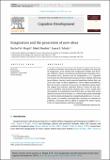Imagination and the generation of new ideas
Author(s)
Sheskin, Mark; Magid, Rachel; Schulz, Laura E
DownloadSchulz_imagination and.pdf (614.9Kb)
PUBLISHER_CC
Publisher with Creative Commons License
Creative Commons Attribution
Terms of use
Metadata
Show full item recordAbstract
A variety of theories have been put forth to explain the function of imagination, most notably that imagination engages and develops children's theory of mind and counterfactual reasoning. Here, we propose that a primary role for imagination is as a cognitive mechanism for efficiently generating new ideas without observing new evidence. Learners must generate hypotheses before they can assess the truth of these hypotheses. Given infinite possibilities, how do learners constrain the process of hypothesis generation? We suggest that learners represent abstract criteria for the solution to a problem and generate solutions that, if true, would solve the problem. As a preliminary test of this idea, we show that, in the absence of any fact of the matter (i.e., when neither prior knowledge nor statistical data distinguishes competing hypotheses), 4–6-year-olds (mean: 63 months) systematically converge on solutions to problems, consistent with an ability to imagine the abstract properties of causal problems and their solutions.
Date issued
2015-01Department
Massachusetts Institute of Technology. Department of Brain and Cognitive SciencesJournal
Cognitive Development
Publisher
Elsevier
Citation
Magid, Rachel W.; Sheskin, Mark and Schulz, Laura E. “Imagination and the Generation of New Ideas.” Cognitive Development 34 (April 2015): 99–110 © 2015 Published by Elsevier Inc
Version: Author's final manuscript
ISSN
0885-2014